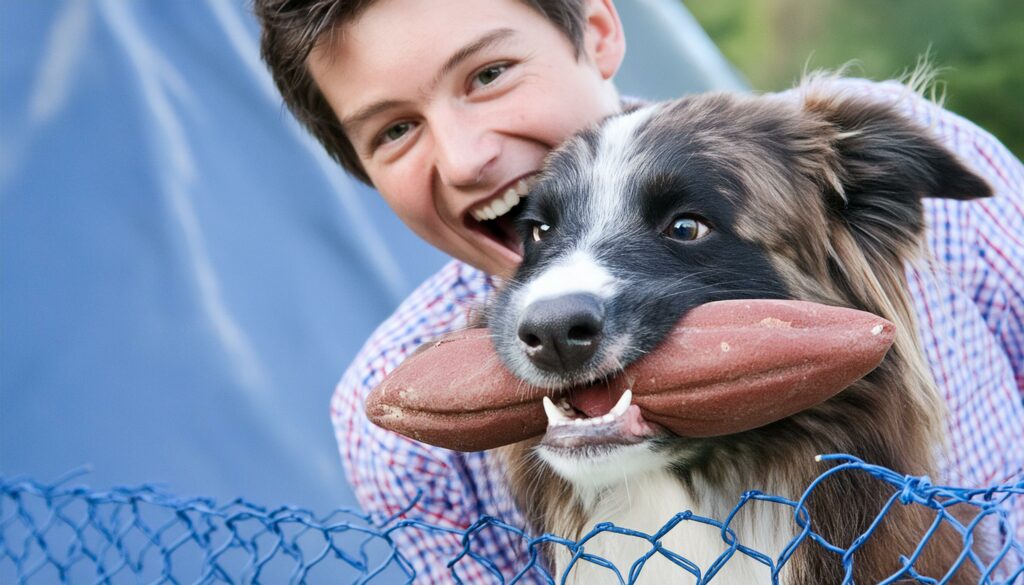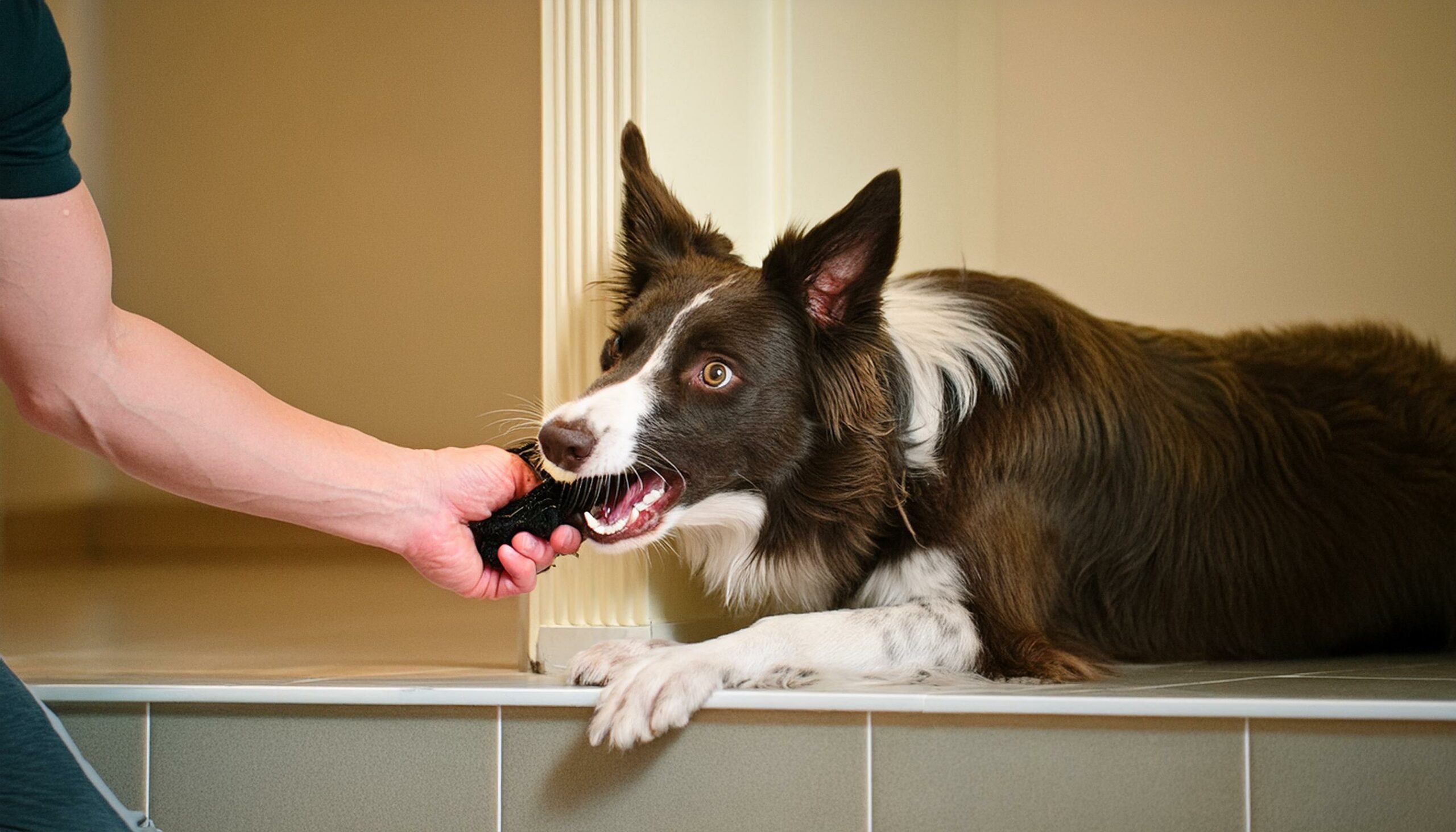Border Collies are renowned for their intelligence, agility, and affectionate nature, making them popular choices as family pets. Originating from the border regions of Scotland and England, these remarkable dogs were initially bred for their herding instincts and continue to excel in various canine sports and working roles.
Understanding Canine Behavior
Factors Influencing Dog Behavior
Understanding the behavior of our canine companions is crucial for fostering a harmonious relationship. Dog behavior is influenced by a myriad of factors, including genetics, environment, socialization, training, and past experiences. By comprehending these factors, we can better interpret and address our Border Collie’s actions.
Reasons Why a Border Collie May Bite
Lack of Socialization
Proper socialization plays a pivotal role in shaping a Border Collie’s temperament and behavior. Without adequate exposure to different people, animals, environments, and stimuli during their formative weeks and months, Border Collies may develop fear, anxiety, or insecurity. In unfamiliar or threatening situations, a poorly socialized Border Collie may resort to defensive behaviors, including biting, as a means of self-preservation.
Fear or Anxiety
Fear and anxiety are common triggers for aggression in dogs, including Border Collies. Loud noises, unfamiliar surroundings, new people or animals, or traumatic experiences can evoke a sense of fear or insecurity in our furry friends, prompting them to react defensively. When a Border Collie feels threatened or overwhelmed, biting may be their way of asserting control or protecting themselves from perceived danger.
Protective Instincts
Border Collies possess a strong instinct to protect their territory, loved ones, and resources. Historically bred as herding dogs, they are hardwired to guard their flock and maintain order in their environment. In a domestic setting, this innate protective instinct may manifest as aggression towards perceived threats, such as intruders or unfamiliar animals. When a Border Collie perceives a potential threat to their pack or possessions, they may resort to biting as a form of defense or warning.
Resource Guarding
Resource guarding occurs when a dog displays possessive behaviors over food, toys, treats, or other valuable items. Border Collies, with their keen intelligence and strong prey drive, may exhibit resource guarding tendencies if they feel their possessions are at risk of being taken away. Biting serves as a means for them to assert control over their resources and deter potential competitors or threats.
Pain or Discomfort
Physical discomfort or pain can also trigger aggressive behaviors in Border Collies. Dogs may not always vocalize or show obvious signs of pain, but subtle changes in behavior, such as aggression or irritability, can indicate underlying discomfort. When experiencing pain or discomfort, a Border Collie may lash out defensively, including biting, as a means of self-protection or communication.
Signs of Aggression in Border Collies
Body Language Cues
Border Collies, like all dogs, communicate their emotions and intentions through body language. Understanding their subtle cues can help us recognize signs of aggression before a biting incident occurs. Common body language cues indicating aggression include stiff posture, raised hackles, bared teeth, narrowed eyes, and a tense or rigid body stance. Paying attention to these signals can help us intervene and de-escalate potentially volatile situations.
Vocalizations
In addition to body language, vocalizations such as growling, snarling, barking, or whining can convey a Border Collie’s emotional state. Growling, in particular, is often a warning sign of aggression and should be taken seriously. Vocalizations may escalate in intensity as a Border Collie’s agitation or anxiety increases, potentially culminating in a biting incident if not addressed promptly.
How to Prevent Biting Incidents
Proper Socialization
Early and ongoing socialization is paramount for preventing aggression and ensuring a well-adjusted Border Collie. Expose your puppy to a diverse range of people, animals, environments, sounds, and experiences from a young age. Positive interactions with different stimuli help build confidence, resilience, and social skills, reducing the likelihood of fear-based aggression later in life.
Positive Reinforcement Training
Utilize positive reinforcement techniques, such as treats, praise, toys, and play, to reinforce desirable behaviors and discourage aggression. Reward your Border Collie for calm, friendly interactions with people and animals, and redirect undesirable behaviors towards more appropriate outlets. Consistent, reward-based training fosters trust, strengthens the bond between you and your dog, and promotes a positive learning environment.
Providing Mental and Physical Stimulation
Border Collies are highly intelligent, energetic dogs that thrive on mental and physical stimulation. Engage your Border Collie in daily activities that challenge their mind and body, such as obedience training, agility courses, interactive toys, scent work, and puzzle games. Fulfilling their innate need for stimulation not only prevents boredom and frustration but also channels their energy into constructive outlets, reducing the likelihood of destructive or aggressive behaviors.
Avoiding Triggers
Identify and mitigate potential triggers for aggression to create a safe and stress-free environment for your Border Collie. Whether it’s loud noises, unfamiliar visitors, other animals, or specific situations, be proactive in managing your dog’s exposure to potential stressors. Gradually desensitize your Border Collie to triggers through gradual exposure and positive associations, helping them feel more confident and relaxed in challenging situations.
What to Do If Your Border Collie Bites

Remain Calm
In the event of a biting incident, it’s crucial to remain calm and composed. Avoid reacting with anger, fear, or aggression, as this may escalate the situation further and erode trust between you and your Border Collie. Take a deep breath, assess the situation objectively, and prioritize safety for yourself and others involved.
Assess the Situation
Evaluate the circumstances surrounding the biting incident to determine the underlying cause and contributing factors. Consider factors such as the dog’s emotional state, triggers, context, and any preceding warning signs or cues. Understanding the root cause of the aggression enables you to implement appropriate strategies for prevention and management.
Seek Medical Attention If Necessary
If the bite breaks the skin, causes significant injury, or poses a risk of infection, seek medical attention promptly. Clean the wound thoroughly with soap and water, apply an antiseptic, and seek medical evaluation for proper wound care and potential rabies prophylaxis. Even minor bites can lead to serious complications if not treated promptly and effectively.
Address Underlying Issues
Once the immediate situation is under control, address any underlying issues contributing to your Border Collie’s aggression. Consult with a qualified veterinarian, veterinary behaviorist, or certified dog trainer to assess your dog’s behavior, develop a behavior modification plan, and implement appropriate interventions. Addressing underlying medical conditions, behavior problems, or environmental stressors is essential for preventing future biting incidents and promoting your dog’s overall well-being.
Conclusion
Understanding why your Border Collie may bite is essential for fostering a safe, harmonious, and fulfilling relationship with your canine companion. By recognizing potential triggers, implementing proactive management strategies, and addressing underlying issues, you can minimize the risk of biting incidents and nurture a strong bond built on trust, respect, and mutual understanding.
Unique FAQs
Q: Can all Border Collies exhibit aggressive behavior?
A: While aggression can occur in any dog breed, proper training, socialization, and care can help mitigate aggressive tendencies in Border Collies.
Q: Is it possible to rehabilitate an aggressive Border Collie?
A: With patience, consistency, and professional guidance, many aggressive behaviors in Border Collies can be successfully managed and rehabilitated.
Q: Should I punish my Border Collie for biting?
A: Punishment can often exacerbate aggressive behaviors in dogs. Instead, focus on positive reinforcement training techniques to encourage desired behaviors.
Q: Are there certain situations where my Border Collie is more likely to bite?
A: Yes, situations such as when they feel threatened, scared, or stressed, or when they perceive a need to protect their territory or resources may increase the likelihood of biting.
Q: How can I tell if my Border Collie’s biting is a serious issue?
A: If your Border Collie’s biting behavior is frequent, severe, or causing injury, it’s important to seek professional help from a veterinarian or certified dog behaviorist.
